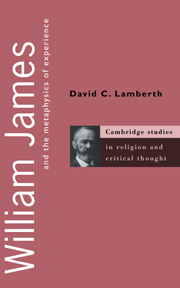Book contents
- Frontmatter
- Contents
- Note on the text
- Acknowledgments
- Introduction
- 1 James's radically empiricist Weltanschauung
- 2 From psychology to religion: pure experience and radical empiricism in the 1890s
- 3 The Varieties of Religious Experience: indications of a philosophy adapted to normal religious needs
- 4 Squaring logic and life: making philosophy intimate in A Pluralistic Universe
- 5 Estimations and anticipations
- Select bibliography
- Index
4 - Squaring logic and life: making philosophy intimate in A Pluralistic Universe
Published online by Cambridge University Press: 22 October 2009
- Frontmatter
- Contents
- Note on the text
- Acknowledgments
- Introduction
- 1 James's radically empiricist Weltanschauung
- 2 From psychology to religion: pure experience and radical empiricism in the 1890s
- 3 The Varieties of Religious Experience: indications of a philosophy adapted to normal religious needs
- 4 Squaring logic and life: making philosophy intimate in A Pluralistic Universe
- 5 Estimations and anticipations
- Select bibliography
- Index
Summary
On 22 November 1907 James received a letter from Lawrence Piersall Jacks of Manchester College, Oxford, inviting him to deliver the Hibbert Lectures the following spring. In his communication Jacks noted that Pragmatism was being discussed everywhere, and that great value would accrue to the University in having the leader of the movement of pragmatism lecture. He further suggested that, given that Manchester College was theological, the “religious appeal of your philosophy would provide the most appropriate range of topics.” James was hesitant to accept the offer, because of the mixed professional reception of his 1906 Lowell Lectures (better known by their 1907 published title, Pragmatism) and his frequently expressed hatred of lecturing and the popular style it necessitated. Claiming to his brother Henry that he could nevertheless see his way to another useful book, James agreed to the eight-lecture series within the week. He also noted to Henry, however, that it would be his last such adventure. “The Present Situation in Philosophy” was James's proposal for a topic.
The text of A Pluralistic Universe is fascinating for students of James's thought, since in the context of a unified argument about the state of philosophy as a discipline, it engages a majority of the themes that had occupied his mind since the beginning of the 1890s. In fact, in the text one finds psychological, moral, religious, epistemological, methodological, and metaphysical themes woven together in a more coherent and overt way than in any other text from James's hand.
- Type
- Chapter
- Information
- William James and the Metaphysics of Experience , pp. 146 - 202Publisher: Cambridge University PressPrint publication year: 1999
- 1
- Cited by



